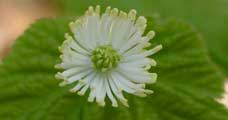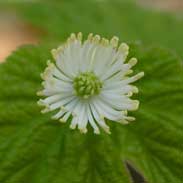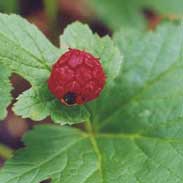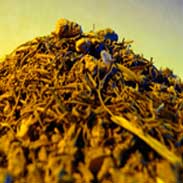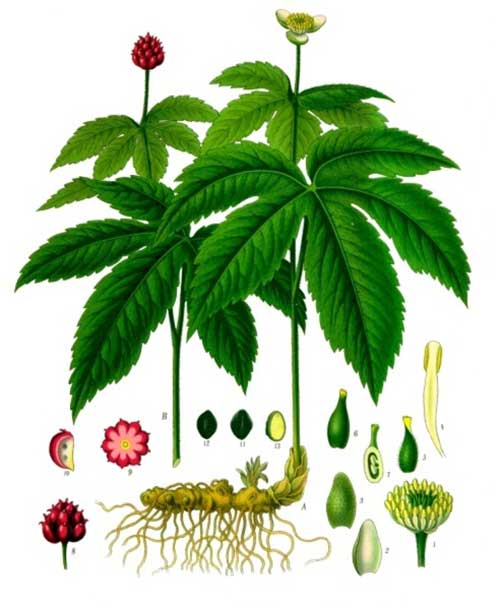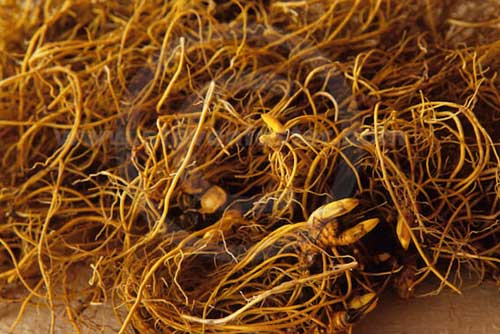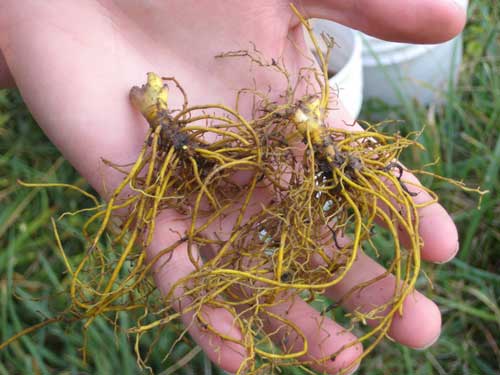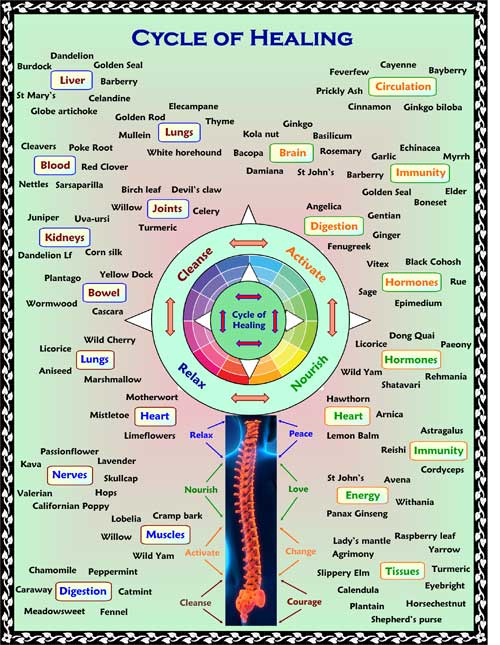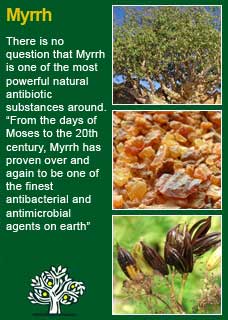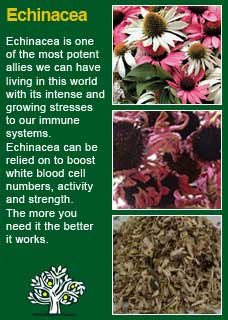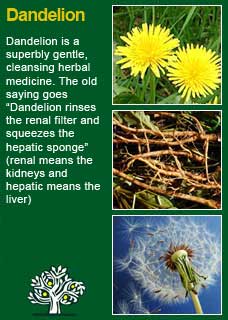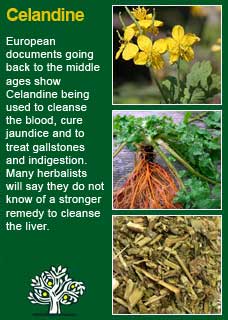
|
|
||||
| Our Pages ABOUT CONSTITUTIONAL MEDICINE
|
In herbal medicine we use the roots of Golden Seal, a small, long-lived and slow-growing plant that thrives in shady woodlands with rich soil in the Northern parts of the United States. The roots are bright yellow, and the taste of Golden Seal is extremely penetrating.
Golden Seal was widely used by the Native Americans as a natural antibiotic and disinfectant. It was much used as an eyewash in particular and was known by the common names of 'Eye-root' and 'Eye-balm'. The root was boiled in water and the resulting tea applied as a wash for skin diseases (which use was passed on to the colonists). The Cherokee Indians pounded the rootstock together with bear fat and smeared it on as an insect repellent. After the American civil war Golden Seal became extremely popular as a general tonic for health and longevity, its price nearly equalled the other most prized herb of the time 'Ginseng' and it was collected to the point of near extinction. The Eclectic physicians especially valued it for digestive disorders saying 'as a remedy for various gastric disorders it takes the leading place'. Jethro Kloss in his book 'Back to Eden' is especially fond of Golden Seal saying it is 'one of the most wonderful remedies in the entire herb kingdom'. TJ Lyle writes 'Golden Seal is the king of tonics to the mucous membranes. It is a mild, positive and permanent stimulating tonic. Its influence, though primarily given to the mucous membrane, extends to all parts of the body, wherever it may be required by the necessities of the vital force or influenced thither by its combination with other agents. It improves the appetite and assists digestion. In the weak and debilitated stomach, especially if there be nervous disturbances or if the gastric membrane be clogged with congested or catarrhal mucous, and in cases of gastric ulceration, Hydrastis given in small and frequent doses will not unfrequently give relief both to the gastric membrane and to the nervous system' WM Cook writes 'this root is one of the purest tonics... it acts slowly and steadily, holding its influence for several hours. Its influence upon the system is very general; and there seems to be no organ or tissue that cannot be benefitted by its appropriate use, though it is most prominently advantageous to mucous membranes, the digestive apparatus, and the uterine organs. Though a stimulant, and hence sustaining to the circulation, it never excites or forces the pulse; and is unlike almost all other stimulating tonics in soothing the irritation connected with feeble and congested conditions of mucous membranes... It improves appetite and digestion; and through the stomach proves one of the most acceptable of all general tonics in indigestion, feeble assimilation, biliousness, leucorrhea, prolapsus, and all forms of debility... It has an excellent sustaining influence on the nervous tissues, and upon the pulse when its caliber is diminished from nervous fatigue and exhaustion' H Felter writes 'Hydrastis is known to stimulate the salivary, gastric, and intestinal secretions, and, to a slight extent, that of bile. It certainly has a most decided action on mucous surfaces, and is one of the most effective of bitter tonics. It sharpens the appetite and promotes digestion. Disorders of a subacute character and atonic states with increased flow of mucus are the types benefited by Hydrastis. It is preeminently a mucous membrane remedy, allaying irritation when present, toning relaxation and correcting catarrhal tendencies... the more the tendency toward chronic debility with oversecretion the more effective is Hydrastis. It first relieves the irritation, then restrains the secretions, and finally gives tone to the gastric membranes. Without question it is our best single drug for chronic gastric catarrh, or chronic gastritis' King's Dispensatory writes 'Golden Seal (Hydrastis) is a valuable drug in disordered states of the digestive apparatus, especially when functional in character. Hydrastis is bitter to the taste, and induces increased activity of the salivary glands. It sharpens the appetite and aids digestion when indicated. It increases contraction of the muscular fibers of arteries and decreases congestion of the genito-urinary tract. Hydrastis is a hepatic (liver) stimulant, and as a stimulant of the gastric and intestinal mucous surfaces its action is marked. Hydrastis exerts its chief action upon the mucous and glandular structures, and to some extent, upon the nervous system. Hydrastis should be remembered in convalescence from diseases, as a remedy for various gastric disorders it takes the leading place' In his book Miracle Healing Herbs John Heinerman writes 'a small number of diabetics I've known over the years have successfully managed to lower their insulin levels by taking two capsules of Golden Seal root per day. One fellow in Toronto, Canada went from close to 30cc of insulin to needing injections of about half that amount each day, after taking the herb for a month' The British Herbal Pharmacopoeia (BHP) describes Golden Seal's actions as stimulant to involuntary muscle, stomachic, oxytocic, antihaemorrhagic, laxative and says it is indicated for digestive disorders, gastritis, peptic ulceration, colitis, anorexia, upper respiratory catarrh, menorrhagia, post-partum haemorrhage, dysmenorrhoea and specifically indicated for atonic dyspepsia with hepatic symptoms. The BHP suggests a dose of 0.5-1 gms of the extract in 60% ethanol. Thomas Bartram writes that Golden Seal's actions are 'alterative, choleretic, antiseptic, anti-inflammatory, anti-microbial, bitter, diuretic, laxative, powerful stomach and liver tonic, detoxifier, increases blood supply to the spleen' and says that its uses include 'mucus membranes generally, ulceration of mouth, throat, intestines. Heartburn, chronic dyspepsia, gastric and duodenal ulcer, diverticulosis, ulcerative colitiis, liver damage. To assist function of old age. Drying to the mucus surfaces and therefore indicated in all forms of catarrh. Painful and excessive menstruation and bleeding from the womb... once used to stimulate contractions of the womb to hasten delivery'
~ Golden Seal is a rich source of the alkaloid berberine which has been the subject of some compelling clinical trials with people: ~ For example, studies have shown it was able to help people with congestive heart failure improve their quality of life, strengthen cardiac function and decrease vascular resistance and incidence of ventricular premature complexes.(Marin-Neto, J. A., Maciel, B. C., Secches, A. L., and Gallo, Junior L. Cardiovascular effects of berberine in patients with severe congestive heart failure. Clin.Cardiol. 1988;11(4):253-260) and (Zeng XH, Zeng XJ, Li YY. Efficacy and safety of berberine for congestive heart failure secondary to ischemic or idiopathic dilated cardiomyopathy. Am J Cardiol 2003;92:173-6) ~ The goldenseal constituent berberine was administered to subjects orally three times daily in a dose of 50mg for 1-4 weeks. The authors reported that leukocyte (white blood cell) counts increased to >4,000 after one week in 40.2% of patients and after two weeks in 38.8% of patients. In subjects with a leukocyte count <1,000, 54.8% of patients experienced increases to >4,000 after two weeks (Liu CX, Xiao PG, and Liu GS. Studies on plant resources, pharmacology and clinical treatment with berbamine. Phytotherapy Research 1991;5:228-230) Berberine was more effective than the drug ranitidine in clearing Helicobacter pylori and improving gastritis in H. pylori-associated duodenal ulcer in a randomised, comparative clinical trial (Hu Fl. Chung Hua I Hsueh Tsa Chih 1993; 73(4):217-219, 253) ~ In two controlled trials berberine was superior to placebo and compared favourably with established drugs in treating giardiasis in children (Gupte S. Am J Dis Child 1975; 129(7):866) ~ in an uncontrolled study berberine taken from 1-3 months improved the major symptoms of patients with non-insulin-dependent-diabetes in combination with a therapeutic diet. Berberine improved patient's strength, decreased blood fats, improved blood pressure and in 60% of the patients it normalised fasting blood sugar levels*(Ni YX, Liu AQ, Gao YF et al. Chin Integr Med 1988; 8(12):711-713) ~ There are nearly 200 published studies and articles on Goldenseal, a PDF showing their titles, authors and when and where they were published can be found here
It may be best avoided by people with high blood pressure though this is really only a theoretical precaution and the blood pressure may simply need some regular monitoring to use it safely. I have not personally seen any issues in any of my own patients with high blood pressure using Golden Seal and, whilst I would want them to be self-monitoring or would check them myself, I would not hesitate to use it if it was indicated.
For some years now, against this proven and safe way of herbalism, there has been a rising tide of excessive caution and scare-mongering in many parts of the world. The same authorities that, not so long ago, decried herbal medicines as ineffectual, have now taken up a different adversarial position; that they are dangerous substances that should only be prescribed by Doctors, who of course have zero training in them. Unfortunately, the same unnecessary fear and worry has crept into many natural health websites and popular publications on herbs. Herbs that we have safely used for thousands of years, that have no reports of adverse reactions in the medical literature despite widespread use by millions of people, are suddenly described as contraindicated because of something that should have been seen as completely unimportant, or at the utmost a merely theoretical concern, such as a laboratory study on one of the herb's constituents to use an all too common example. I wonder sometimes if the writers of such articles feel that the herb will be more deserving of respect if it is thought to be a little bit dangerous, in other words more like a drug than something that has simply come out of the earth and been used by ordinary people for generations beyond count. There is just so much misinformation about herbal medicine on the internet now. Ludicrous claims and cautions abound in equal measure; it seems like one group are trying to make money out of the public whilst the other are busily trying to scare them off. I have to believe that the kind of reader who takes the time to read pages on herbs that are as extensive as this one is much less likely to be swayed by marketers or misinformers. I hope that you will keep your wits about you if you get conflicting opinions from people who have never really got to know these herbs, who have never worked with them, or learned how to use them safely and effectively. I want to remind you that the reason that herbs can never be patented and owned by any individual or corporation is because they are, and always will be, the People's medicine. They belong to all of us and it is my great hope in sharing this work that you will learn how to use them wisely for yourself, and the people you care for. Be safe, but do not be afraid. Golden Seal is a rare and precious herb that has been badly over-harvested. If there is any question that it might be harvested from the wild then don't use it but use Barberry instead. Barberry is still a great herb that shares many of the tastes and actions of Golden Seal' you just might need a bit more of it to get the same effects (about double is my rough rule of thumb), more info on Barberry here
I love Golden Seal and use a great deal of it in my work, especially since we have been able to obtain organically cultivated dry material and so can economically and sustainably make our own tinctures from it. If you are learning herbal medicine or have your own personal reasons to use this herb, then be sure to carefully read the snippets from the great Eclectic writers quoted in the section above on 'how has it been used'. These are only excerpts, each of those authors wrote pages more about it because they loved it too, and wrote from their experience in using it for many people with diverse health problems to consistently good effect. This line from Lyle 'Golden Seal is the king of tonics to the mucous membranes gives a precise indication to where it can be of profound benefit. Many people have chronic conditions in their nose, sinuses, ears, throat or digestive system where an excess of unhealthy mucus is causing ill-health and in such cases it can be seen that there are healing properties within the Golden Seal that can help to cleanse, bind and heal these damaged, delicate and important surfaces in the body. Two common examples of how I personally use Golden Seal in formula are found in the article on sore throats here and the article on sinusitis found here Golden Seal can also be a particularly potent medicine for liver congestion and I often think of using it with someone when they have such signs as a heavy, coated tongue, a languid or sluggish pulse, excess debris in their blood plasma and symptoms of mucus congestion. Anyone reading this that is studying herbal medicine or, for their own personal reasons, wants to get to know this potent plant ally much more deeply, is warmly recommended to take a few drops of the tincture of Golden Seal, hold them in the mouth for a few moments and then swallow and observe what happens next. If you do this with a quiet and attentive mind, I am sure you will get a palpable experience of the herb that will do more to help you to truly understand it than any amount of abstract and academic learning. This is a herb that does things in the body and keeps doing them long after you have been introduced! Cleansing, activating, penetrating, uplifting... these are the kind of words that have come to me and fellow students or colleagues with whom I have made the same experiment, but the words are only guides; try for yourself and see what you feel. Further to this, if you would like to learn more about the ancient art of pulse testing, a simple but powerful way to ask the intuitive intelligence of the body for its responses to a herb by feeling the pulse whilst giving a tiny dose by mouth, read here Golden Seal is a wonderfully strong, cleansing and energetic medicine and really only small amounts are required for excellent results. For most people this equates to not more than 1 or 2 mls of the tincture in a day. Golden Seal works particularly well with Dandelion and/or Celandine to treat and cleanse the liver and it combines perfectly with Myyrh and Echinacea to treat resistant bacterial or fungal infections on the skin or the mucus membranes.
Much of the information here about the traditional uses of Golden Seal is consistent with the model of thinking whereby one may treat problem A with plant B. There is value in this approach, especially in how it helps us pass on useful knowledge to one another, but it falls short in one vital area; and that is that people are not all cut from the same cloth! Something that works brilliantly for one person may do less for another -- why is this? Part of the reason is that people vary in their constitutions as to whether they are either hotter or cooler and, at the same time, either dryer or damper. This useful and rather fascinating subject is introduced further here Another big part of using the right herb when it is most needed comes from understanding the need to treat what is going wrong for the person that had led up to their getting a health condition. In this light, Golden Seal can particularly offer its benefits when a cleansing action is needed in the 'cycle of healing', more about this here
Please understand that I cannot advise you, including on products or dosage, without seeing you in person in my clinic but for ideas
on how you might find a good herbalist in your area read here |
|
|
© 2011 R.J.Whelan Ltd
